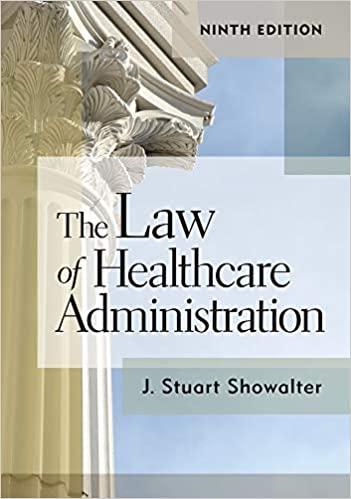in charge of the floor, according to the court] at her desk in the hospital before 9
Question:
“in charge of the floor,” according to the court] at her desk in the hospital before 9 am on May 12, 1967, said that her name was Juanita Monroe, her doctor was in Illinois, she had come to Ohio County to attend a funeral and she was afraid she would not be able to get back to Illinois before she had her baby.
Nurse Hartley assumed she wanted to be admitted for obstetrical (herein OB) care.
There were only four doctors admitted to practice in the hospital. Nurse Hartley consulted her list and found that Dr. Beard
(according to the doctors’ informal agreement among themselves) was on call that week. He was at the time in the operating room. Upon Nurse Hartley’s inquiry whether to admit decedent, Dr. Beard [replied] that he did not handle OB cases. Upon advice from the hospital administrator that another of the four doctors, Dr. Johnson, was making rounds, Nurse Hartley asked him the same question and Dr. Johnson replied that he did not handle “walk-in OBs.”
Decedent did not advise that she had been delivered of a child at the Ohio County Hospital in June 1964, admitted by Dr. Charles Price of Hartford (one of the four doctors practicing in the Hospital) and had again consulted Dr. Price within the past year.
Decedent was advised that she could get OB service in Owensboro and Louisville, with doctors on call, and replied she did not want to go to Owensboro or Louisville, but would call a taxi to go home. Nurse Hartley assisted her in making the call. Being advised that decedent was still there more than an hour later, Nurse Hartley consulted with the hospital administrator and was told to call Bill Danks, ambulance driver, who promptly appeared and offered to take decedent wherever she wanted to go. She declined, and a taxi finally took her away.
Discussion Questions
1. What other facts would you like to know about this situation as you consider whether the case was decided correctly?
2. This decision is now more than 45 years old; would the case be decided differently today? If so, why?
3. In a separate portion of the opinion, the court uses the expression “plaintiff’s intestate” in referring to the plaintiff, Mr. Hill. What does that expression mean? Why is Mr. Hill the plaintiff in a case involving an OB patient?
4. What is the significance, if any, of the fact that the hospital is a public hospital that received Hill-Burton funds?
Step by Step Answer:






